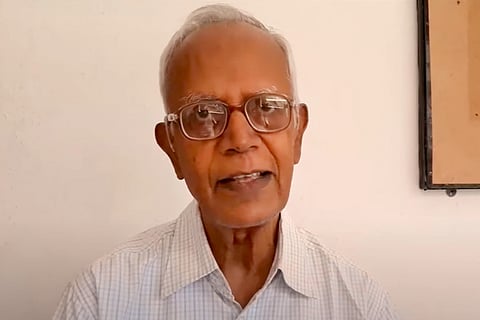

The Madras High Court has quashed a notice from the tahsildar of Nallampalli in Dharmapuri district that banned an environmentalist from installing a memorial pillar for Stan Swamy on private land. Environmental activist Piyush Manush had been forced to approach the Madras High Court after the Dharmapuri Superintendent of Police (SP), district Collector and the Nallampalli tahsildar banned him from installing the memorial pillar on his own land. The district administration alleged that the Jesuit priest and Adivasi land-rights activist had “held relations with Naxals and Maoists” and that “tribal villages are a paradise for the convergence and breeding of anti-social elements”.
In 2021, Piyush constructed a pillar with a painting of Swamy and a description of his life’s work. This was to be erected on his property in Nekkundi village. However, ahead of its installation, the activist received a notice from the Nallampalli tahsildar, threatening legal action if the pillar was unveiled.
Referring to a 2017 government order (GOMS 183), the tahsildar said that Piyush had not obtained permission from authorities before installing the pillar. Piyush pointed out in court that the GO is not applicable to statues on private land, and the court upheld his argument
Further, the activist alleged in his petition that a Dharmapuri-base police official from the CB-CID, accompanied by the local village administrative officer (VAO) had searched the grounds for the pillar in 2021, without providing warrants. Police officials had allegedly said that they were conducting searches based on the district Collector’s order and threatened to arrest Piyush and others on the premises if they did not comply.
The district authorities’ stance on Stan Swamy is at odds with that of the state government. After Swamy’s death in prison in 2021, Tamil Nadu Chief Minister MK Stalin had said “His life is commendable. Father Stan Swamy fought till his death for the rights of people at the grassroots.”
Days after Swamy’s death, CM Stalin, DMK Deputy General Secretary Kanimozhi, and Chennai Central MP Dhanyanidhi Maran alongwith Chidambaram MP and VCK president Thol Thirumavalavan, laid wreaths at a memorial service at Chennai’s Loyola College and paid their respects.
Yet, the Additional Government Pleader told the court that the pillar “relates to a person, who was related to Naxals and Maoists. It would hamper law and order of the area.” The advocate appearing for the Dharmapuri SP argued, “Tribal hamlets have turned into a paradise for the convergence and breeding of anti-social elements with ideology opposing the government and its functions.” The SP’s counsel also claimed that the pillar was going to be unveiled in a sensitive area and that it would “lead to communal clashes”.
The court dismissed these arguments, stating, “When an allegation put forth against a person is not proved, then the said allegation is nullity. In the instant case, Father Stan Swamy has taken more efforts for the welfare of tribals and the issue on hand is the erection of his statute or stone pillar on the petitioner’s private land. (sic)”
The court also pointed out that the legal challenge to the contested GO was not res integra (without precedent), referring to several other cases heard by itself that had ruled in favour of the petitioners. In view of these precedents, Justice M Dhandapani who was hearing the case, set aside the Nallampalli tahsildar’s notice and granted permission for Swamy’s memorial pillar to be installed in Piyush’ property.
Swamy passed away in Mumbai on July 5, 2021 at the age of 84. He was undergoing treatment at the intensive care unit of the Holy Family Hospital, where he was shifted from the Taloja prison in Navi Mumbai following a High Court order in May that year.
The Bombay High Court had been hearing petitions seeking bail and a constitutional challenge to a section of the Unlawful Action Preventions Act, (UAPA), under which he had been charged in the Bhima Koregaon case, when his lawyer announced Swamy’s death. He had been on life support due to his deteriorating condition at the time of his passing.
Swamy’s mistreatment in Taloja prison, such as being denied a sipper to drink water, despite suffering from Parkinson’s Disease, and his death, drew widespread outrage against the Union government, including from many Opposition leaders in Tamil Nadu, where Swamy originally hails from, and the rest of the country.